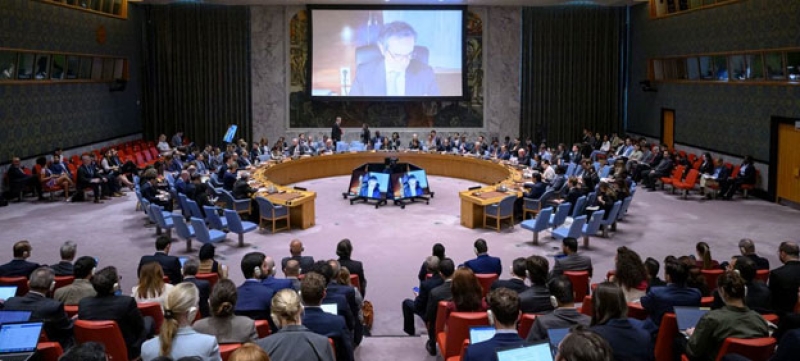- Can Dhaka’s arms recovery drive ensure peaceful polls? |
- ‘Unhealthy’ air quality recorded in Dhaka Monday morning |
- BD peacekeepers' deaths: UN chief calls Dr. Yunus, offers condolence |
- Bangladesh Plans Rockets, Satellites, and Space Industrial Park |
- India willing to work together inspired by shared sacrifices of past |
Israel’s Iran Strike Risks Wider War, Undermines Diplomacy

A Security Council meeting on the rapidly escalating crisis in the Middle East. 13 June 2025. Credit: UN Photo/Loey Felipe
Israel’s attack on Iran’s nuclear facilities may seem justified if one takes Prime Minister Netanyahu’s explanation at face value. However, it is doubtful that he and former President Trump fully considered the serious regional ramifications of such an attack or whether negotiations might have led to more positive outcomes.
Netanyahu has finally executed what he has long desired—striking Iran’s nuclear and military installations and eliminating several military commanders and nuclear scientists.
Although Trump initially appeared to distance himself from the operation, it is clear he approved it. Without his consent, Netanyahu likely wouldn’t have taken such a step—one that risks drawing the U.S. into a broader conflict with potentially catastrophic consequences.
Trump and Netanyahu devised a strategy in which the U.S. would deny involvement to avoid provoking Iran into attacking American targets. As Secretary of State Marco Rubio stated:
“We are not involved in strikes against Iran, and our top priority is protecting American forces in the region. Israel advised us that they believe this action was necessary for its self-defense.”
On Wednesday, Trump expressed doubts about the outcome of upcoming nuclear negotiations with Iran, already aware of Israel’s pending attack. Despite bipartisan criticism of Netanyahu for the timing, many U.S. lawmakers remained unaware of behind-the-scenes coordination between the two leaders.
Under the plan, Israel would strike, and the U.S. would remain publicly detached, reducing the chance of retaliation against American forces. Still, the U.S. would assist by intercepting incoming Iranian missiles.
Trump's reaction on his Truth Social account reinforced this narrative. He threatened further attacks unless Iran agreed to a nuclear deal, writing:
“I gave Iran chance after chance to make a deal... They are all DEAD now... Iran must make a deal before there is nothing left... JUST DO IT, BEFORE IT IS TOO LATE.”
He also described Israel’s attack as “excellent” during an ABC interview, warning of “more to come” if Iran refuses to comply.
However, despite Israel’s recent success in weakening Iran’s military proxies and air defenses, Iran retains significant military capabilities and is unlikely to capitulate. Expecting Iran’s leadership to return to talks after such humiliation is unrealistic.
Iran will likely retaliate. Even if it suffers significant losses, it will act to preserve national pride. Ironically, the attack may unite a population that otherwise opposes its government, deepening economic suffering but bolstering nationalist sentiment.
The strike has also strengthened hardline voices in Iran who opposed diplomacy from the start. They now feel vindicated, believing the U.S. never intended to negotiate in good faith.
Meanwhile, Arab Gulf states may quietly welcome the damage to Iran but now fear being dragged into a regional war. Such conflict would disrupt oil exports and derail their economic priorities.
The attack may also drive Iran closer to Russia and China, which will eagerly use the crisis to expand their influence and challenge U.S. dominance.
Even if Israel manages to destroy Iran’s nuclear facilities, rebuilding would be inevitable—likely pursued with renewed urgency and in secret. Iran could also withdraw from the Non-Proliferation Treaty, triggering nuclear proliferation across the region.
Trump and Netanyahu appear to have underestimated Iran’s resilience. With a population of 90 million, vast resources, strategic geography, and a deep cultural legacy, Iran remains a regional power. It will rebuild and reassert itself.
In the end, any lasting solution to Iran’s nuclear program must come through diplomacy. Netanyahu’s risky gambit and Trump’s rushed strategy may have sabotaged that path—potentially exacting a price far greater than any short-term gain.

